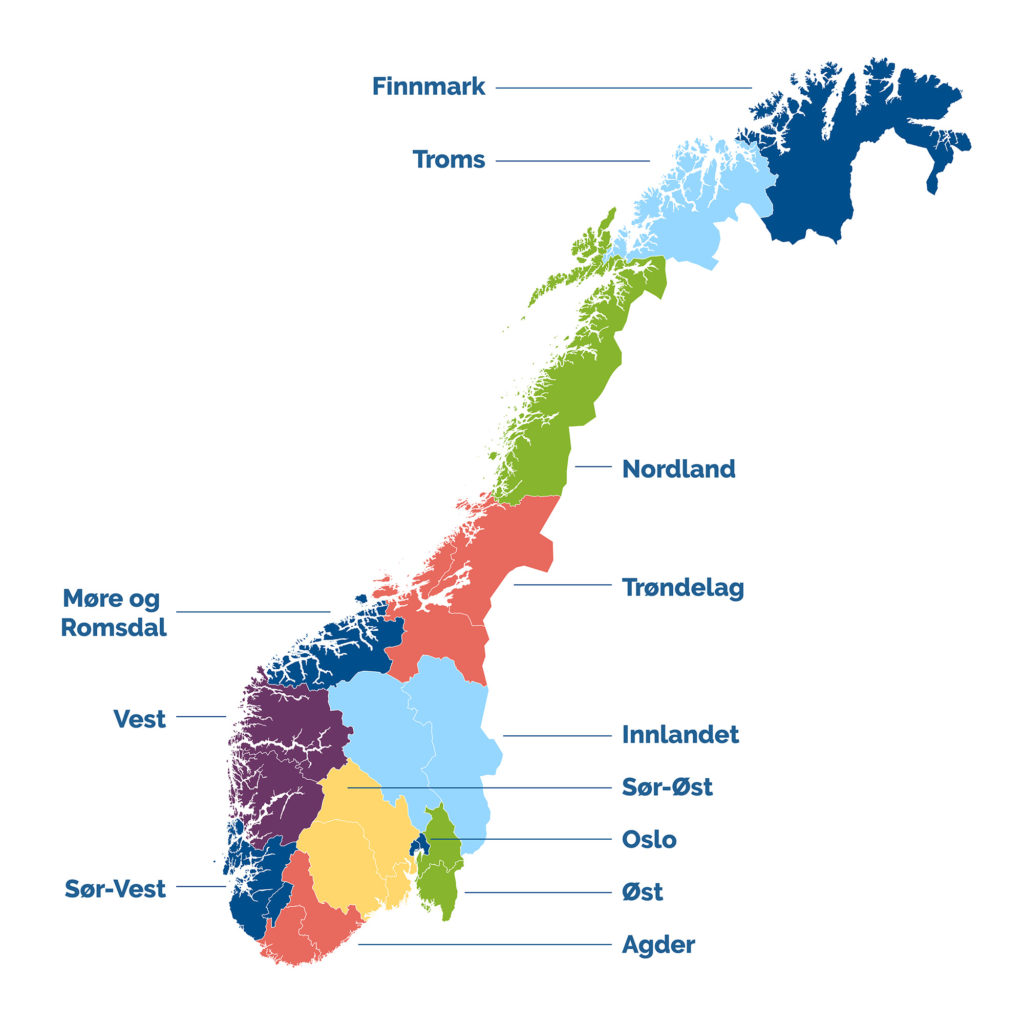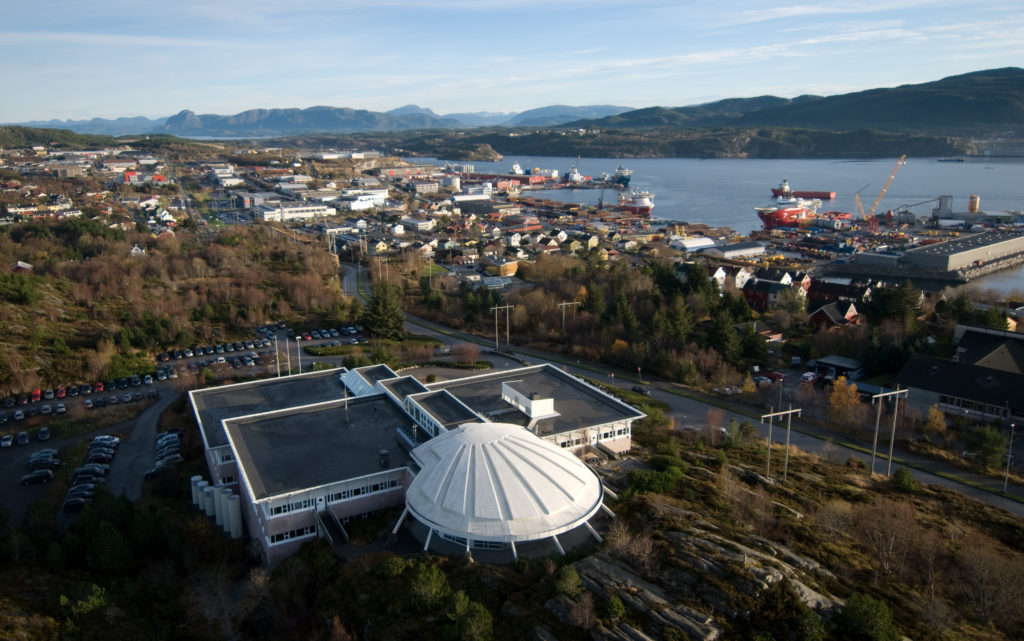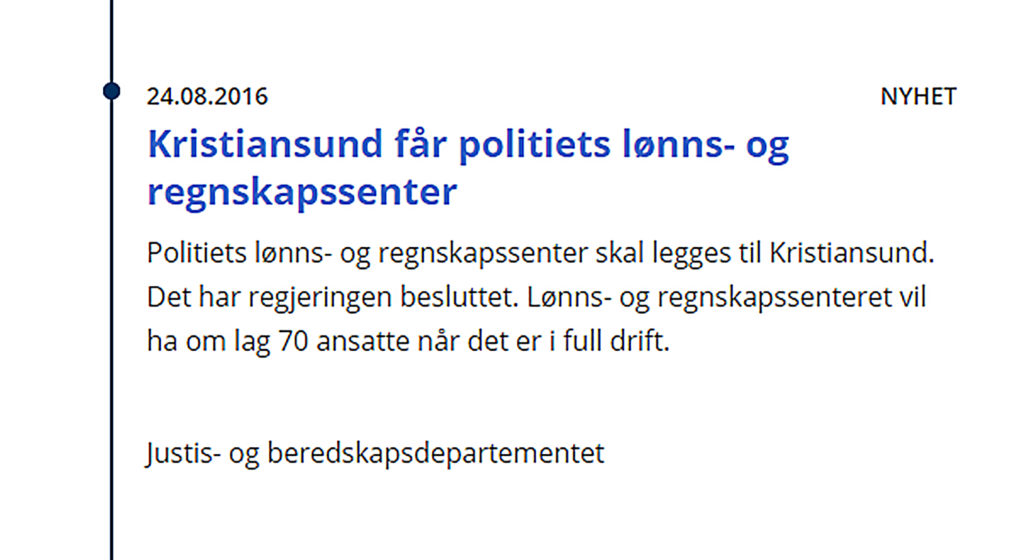About Project
…
…

The government proposed a new police reform in 2013 which included merging the Nordmøre and Romsdal district with Sunnmøre, with the commissioner moving from Kristiansund to Ålesund.
These plans prompted outrage in Nordmøre and added fuel to the flames of an old local government dispute which has created and continues to maintain dissension in Møre og Romsdal county.
The presence of both Shell and Statoil has helped to propel Kristiansund to the status of the oil centre for this part of Norway. Responsibility for emergency preparedness in the area of the NCS lying roughly between Ålesund to the south and Brønnøysund in the north lay in the town for some three decades.
This region includes such fields as Draugen, Ormen Lange, Åsgard and Njord, as well as the Tjeldbergodden and Nyhamna gas facilities on land. Nordmøre and Romsdal was one on four police districts along the coast responsible for strategic and operational leadership of any incidents arising on an offshore installation.
The others were Rogaland for the NCS south of the 62nd parallel, Helgeland between 65°30’N and 68°30’N and Troms above 68°30’N and the seas outside Svalbard’s territorial waters. Rogaland police district, embracing Stavanger, has also been required to provide assistance in investigating major oil-related incidents above 62°N.[REMOVE]Fotnote: National Police Directorate (2011): PBS 1. Politiets beredskapssystem, del 1. Retningslinjer for politiets beredskap, 103.
The commissioner is responsible for the exercise of all police powers within their offshore area, and for the commitment of resources required to discharge duties on the NCS. They are also responsible for any post-response investigation.
In addition to preparing an updated plan for offshore emergency response, the offshore police district collaborates with the armed forces in exercises. It maintains contacts with the operator companies and sees to it that they also understand their functions during an actual incident.
The police are also charged with established reception facilities on land in the event of a possible evacuation following an offshore incident. They must keep in regular contact with the Petroleum Safety Authority Norway (PSA), and have investigating officers with expertise on matters relating to petroleum operations.
Finally, each offshore police district must have service personnel with specialist knowledge for taking over an installation after a possible action phase.
The number of Norwegian police districts was reduced from 27 to 12 on 1 January 2016 in what has been called the “close policing” reform.
 hvem har ansvaret når alarmen går, kart, illustrasjon, engelsk,
hvem har ansvaret når alarmen går, kart, illustrasjon, engelsk,After Nordmøre and Romsdal was merged with Sunnmøre, as noted above, the National Police Directorate (NPD) wanted the headquarters of the Møre and Romsdal district moved to Ålesund. That came as no surprise. This is the county’s largest town and lies midway between Bergen and Trondheim. The NPD also maintained that it also had the biggest recruitment base. But the question then was where responsibility for petroleum-related incidents off the Møre and Trøndelag coasts should lie.
The government wanted the NCS split between two police districts – south-west run from Stavanger and north from Tromsø – but failed to secure Storting (parliamentary) support.
Offshore responsibility was to continue to be divided between four police districts. But would this remain in Kristiansund or follow the police commissioner to Ålesund? Kristiansund and its hinterland mobilised vigorously to retain the police commissioner and responsibility for offshore emergency preparedness.
A number of consultation responses emphasised the extensive response collaboration built up in the town over 30 years, which made it easy to mobilise resources and expertise. In the event of accidents, moreover, Kristiansund had offshore expertise, a heliport and plans for taking care of possible injured personnel.
This interaction with the offshore industry’s emergency response resources was regarded as significant for the police’s ability to discharge its NCS duties.
In the event of an incident, the companies could quickly install their liaison officers at the police station. This physical presence was important for optimal coordination.
Although the police had and have specialised expertise on petroleum activities, they depend on supplementary knowledge from the industry when accidents occur offshore or at land plants.[REMOVE]Fotnote: Consultation: Norwegian Official Reports (NOU) 2013:9 Ett politi – rustet til å møte fremtidens utfordringer. Comments from Kristiansund local authority and KOM Vekst (Kristiansund and District Industrial Forum) of 3 October 2013; Nordmøre and Romsdal police district of 4 September 2013; Orkide (assembly of council chair and local authority chief administrators in Nordmøre) of 2 October 2013.
The fear was that moving the police commissioner and thereby offshore responsibility would mean a critical loss of special expertise, reduced efficiency, loss of time and increased costs.[REMOVE]Fotnote: Inderhaug, Erik (2016): “Hvordan skal politiet sikre denne?” Politiforum. https://www.politiforum.no/artikler/hvordan-skal-politiet-sikre-denne/386956 (published 27 January 2016, downloaded 9 January 2018).
 hvem har ansvaret når alarmen går, engelsk
hvem har ansvaret når alarmen går, engelskA transfer to Ålesund might sunder strategic and operational leadership in the police from the other response teams for offshore operations.
Staying in Kristiansund would mean that, within a few minutes of an incident on Draugen, the police could be physically present in the second-line response at Norske Shell’s Råket facility. For their part, Ålesund’s supporters argued that emergency response would related in most cases to a serious event which required the police to establish a crisis team.
Where this was led from would be a secondary consideration. The specialist team in Kristiansund could deal with offshore emergency preparedness regardless of where the commissioner sat.
Norske Shell wanted the police in Kristiansund to retain responsibility for offshore preparedness, and responded to the consultation even though it was not formally invited to comment. The company stressed the good collaboration its emergency preparedness team had with the Nordmøre and Romsdal district’s offshore division, and the importance of maintaining this.
It also complained over the lack of specific details on how important considerations were to be handled if the headquarters were transferred to Ålesund.
“Our experience is that the understanding of oil sector processes, planning, emergency organisation and industry terminology enshrined in the operations centre, staff functions and operative response leadership has been positive for handling and investigating incidents on the NCS,” Shell stated.[REMOVE]Fotnote: Inderhaug, Erik (2016): “Hvordan skal politiet sikre denne?” Politiforum. https://www.politiforum.no/artikler/hvordan-skal-politiet-sikre-denne/386956 (published 27 January 2016, downloaded 9 January 2018).
“Such expertise is built up through good communication and joint training. We would have wished to see a clarification of how this is envisaged in the future.”
Kristiansund has called on a number of occasions for more government and public sector jobs, and this was highlighted in the consultation response from the Kristiansund and District Industrial Forum (KOM Vekst).
The latter noted that Ålesund and Molde had received 190 and 139 new central government and county council jobs respectively in 2009-13, while the figure for Kristiansund was one.[REMOVE]Fotnote: Consultation: NOU 2013:9 Ett politi – rustet til å møte fremtidens utfordringer – KOM Vekst (Kristiansund and District Industrial Forum) of 3 October 2013.
When the town lost out to Molde in the fight over the Nordmøre and Romsdal hospital, the future for many expertise-based jobs vanished from the region.
Against that backdrop, the issue of the police commissioner’s headquarters generated strong feelings in Nordmøre. This involved not only emergency preparedness, but also local employment.
 hvem har ansvaret når alarmen går, nyhet, engelsk,
hvem har ansvaret når alarmen går, nyhet, engelsk,The outcome was that the police commissioner post was transferred to Ålesund together with a substantial number of jobs. A government decision to locate the police pay and accounting centre, with 70 employees, to Kristiansund was therefore perceived as a form of compensation.
That was denied by justice minister Anders Anundsen, who claimed that the move formed part of a 2016 agreement with the Liberal Party on decentralisation of government employment.[REMOVE]Fotnote: Written question from Ingrid Heggø (Labour) to the minister of justice and emergency preparedness. Storting, document no 15:1539 (2015-2016), 9 September 2016.
It quickly became clear that the town would only be getting 50 new jobs, since another department located in Stavanger was taking over part of the police pay function.
To compensate for the “loss” of the 20 promised posts, an equal number of additional jobs were created at the Kristiansund tax office. According to the council, the extra employment more than compensated for the reduction in police posts.[REMOVE]Fotnote: Kristiansund – information publication from Kristiansund local authority. No 7, July 2017.